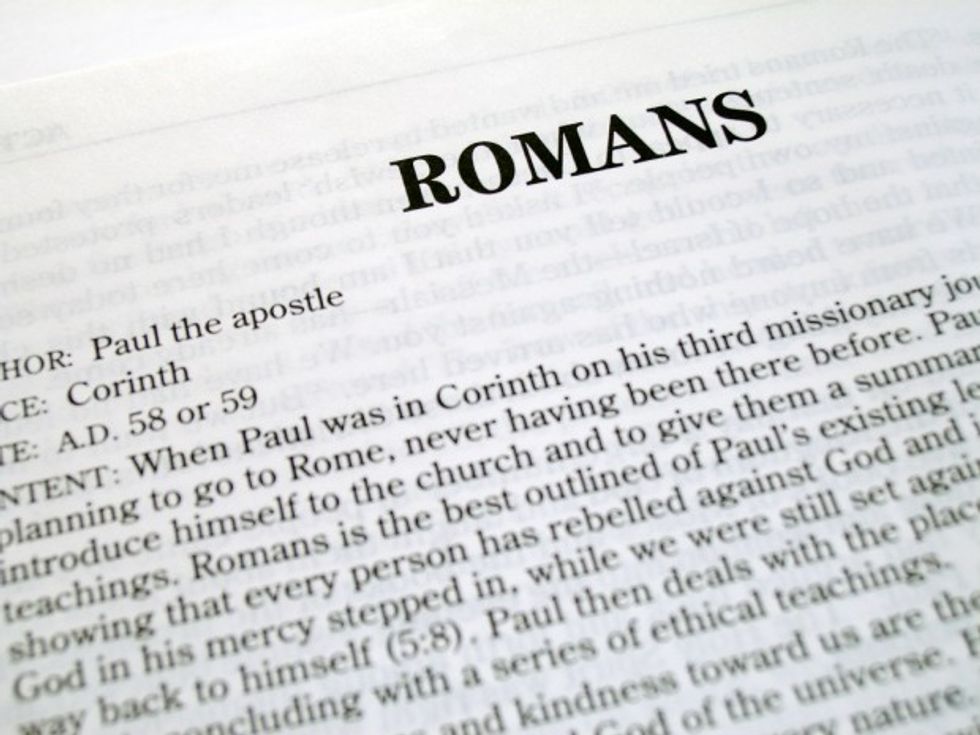
Shutterstock

Christian leader Grant Berry, founder of Reconnecting Ministries, has published a piece about Romans 11, pondering whether the New Testament chapter is the "key to the end times."
It's a biblical chapter that has served as a point of debate surrounding modern-day Israel's potential role in biblical prophecy.
That central discussion centers on whether Israel still has remaining prophesies to be fulfilled in the scriptures, or whether "Israel" actually refers to the contemporary Christian church, which some believe has inherited God's promises following Jesus' life, death and resurrection.
After all, Romans 11:26 reads, in part, "All Israel will be saved." In this sense, understanding what, exactly, "Israel" is referring to is important, with various interpretations profoundly impacting how one views a variety of theological and political issues.
"Romans 11 does not refer to Jewish believers per se, but rather to the rest of Israel (the Jewish people) who are still broken off due to a rejection of the gospel and, as a result, how the Gentiles in the church should relate to them," Berry wrote of Romans 11.

But before diving deeper into the chapter, he discussed the contents of chapters nine and 10, explaining that these scriptures highlight God's "election of promise and mercy for both Jew and Gentile," noting that the acceptance of gospel — and Jesus Christ — is the same when it comes to both groups. God, Berry believes, has intentionally called both Jew and Gentile.
But Berry said that Israel struggled to accept this calling due to the law that had previously been received from God.
"They had learned to pursue it through works and not by faith, to attain a law of righteousness that had little room for the mercy of God, which was to be found in His only begotten Son, who was at the end of the law for all who believed," Berry wrote.
He continued, explaining how he believes that the old law God gave to the Jews relates to the new covenant that came through Jesus:
The apostle Paul makes the sovereignty of God clear to us in these chapters: "Shall what is formed say to Him who formed it, 'Why did you make me like this?'" (9:20) In other words, who are we to question God in the scheme of things? But the religious leaders could not accept this and then led most of Israel astray. God had moved on from the old system of the law, which brought sin into account, into the New Covenant in which His law would be circumcised into our hearts through His Holy Spirit, where we would all know God for ourselves (Jer. 31:31-34).Any of the Jewish people who accepted Yeshua/Jesus at this time, of whom there were many, helped to establish the new community of believers the world now calls the church. For all believers were now welcome into the kingdom of God, both Jew and Gentile alike. The playing field concerning its entrance had now been leveled.
Despite this new "playing field," Berry said that Israel's heritage and covenants did not expire, adding that he believes that gentiles, too are associated with those covenants through faith. He explained that Jesus transferred Israel's authority to the apostles and the gospel was then carried throughout the world, allowing everyone to be "grafted into Israel's covenants and promises."
But Berry said that the current dynamic surrounding Israel can make understanding these elements quite difficult for some.
"This can be extremely confusing to us today, some 1,600 years later, in light of the fact that physical Israel is still broken off spiritually, and because the church severed its Jewish roots and heritage through the Roman assimilation (fourth century), establishing Christianity as a separate and distinct religion," Berry wrote.
It is in Romans 11, though, that he said that Paul outlines the need for Israel to still be "grafted in to complete the bride and family of God." In that chapter, Berry said that the apostle makes it clear that gaining salvation is the same for both groups and, though unbelieving Israel was broken off, there is a desire expressed for it to to be grafted in again.

"However, now that he has imparted this background and laid this foundation, he is able to explain better the path of Israel and how we should relate to them, which he outlines in Romans 11," Berry wrote of Paul. "Please understand, as a Jew, no one had to tell Paul or give him a heart for his own people, as this was just natural for him. Even to suffer at their hands, their stonings and the like, especially with all of the revelation he had received from God concerning Israel, their rejection and their awakening."
He concludes by saying that Paul paints a "prophetic picture" of Israel's future spiritual reconnection.
Berry's comments come amid ongoing debate in Christian circles over whether there are still prophesies and covenants for the state of Israel or whether Christians, as a collective church, have now essentially replaced Israel.
Replacement theology, also known as supercessionism, essentially teaches the latter idea — that the church is now the replacement for Israel. Others, though, see Israel and the church as being distinct, with each having relevance in God's plan.
Read Berry's piece in its entirety here. You can read more about suppercessionism here and more about the belief that Israel and Christians are still distinct groups in terms of God's prophetic plan here.
(H/T: Charisma News)
--
Follow the author of this story on Twitter and Facebook:
Billy Hallowell